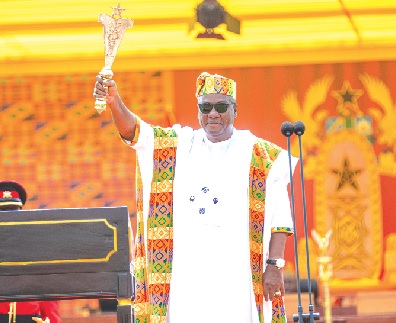President Mahama had an active first few days in the hot seat. Reminiscent of President Trump, who became president for the second time earlier this week, President Mahama issued a flurry of policy pronouncements on corruption, constitutional reform, and other important matters.
He publicly encouraged the investigation of the national cathedral controversy to see if monies were inappropriately employed during its non-building between 2017 and 2025.
President Mahama’s promise, made during the election campaign, regarding state subsidy for Muslims wishing to undertake the hajj pilgrimage to Mecca, was controversial.
It appears that Ghana cannot afford such a subsidy. This means that Ghana’s Muslims would have to pay themselves to undertake the costs of the hajj – in the region of $6,000 – which, incidentally, is in line with what fellow Muslims in neighbouring West African countries pay.
President Mahama is intent on hitting the ground running during his second time as president. Also like President Trump, President Mahama has just one – four-year – term to leave his mark on Ghana, leaving a legacy of which he can be proud.
Unlike President Trump who gained the votes of most of the USA’s committee Christians, it is unclear the extent to which voters in Ghana chose to vote for John Dramani Mahama because of, or despite, his religion.
Of course, voters are not asked about their religion when casting their ballot and, to my knowledge, no serious research has been done to ascertain the voting preferences of Ghanaians according to religious affiliation.
It may be that Muslims voted for the NPP’s Mahamudu Bawumia because of his religious faith, while Christians, including Ghana’s ubiquitous Pentecostals and Charismatics, might have preferred John Dramani Mahama of the NDC, a senior member of the Assemblies of God Church.
Religion
When I first visited Ghana in the mid-1980s, around 40 per cent of Ghanaians were Christians. Then, there were estimated to be more than 500 Christian denominations in Ghana.
Today, according to the 2021 census, 71.3 per cent of Ghanaians are members of the country’s abundant Christian churches, which may now number in the thousands.
There is a growing interest in studies dealing with religion in the lives of contemporary Africans linked to reported resurgence or revival of religious activities in many African countries, including Ghana.
Unlike Western countries, Africa does not appear to be secularising. Instead, many Africans, including Ghanaians, regard secularisation as a baleful Western import imposed on Africans by development agencies or Western academic education. Evidence for this comes in concerted Christian – and Muslim – hostility in Ghana to President Mahama’s suggestion that an LGBTQ+ bill is not needed because the issue can be addressed by better education of Ghana’s schoolchildren. Many Ghanaians regard LGBTQ+ as a pernicious import imposed on Ghanaians by the wicked West.
John Mbiti, a Kenyan-born Christian philosopher and writer, who died in 2019 aged 87 years, famously proclaimed that Africans are generally ‘notoriously religious’.
Mbiti would not be surprised to see the high levels of religiosity in Ghana today. Ghanaians appear to be increasingly religious, and the types of religious organisations are changing as well.
Alongside the mainstream traditional Christian denominations (i.e., old established churches such as Protestant and Catholic), a collection of groups that include African syncretic, faith-healing organisations, charismatic, and evangelical churches have emerged in great numbers.
The increasing popularity of these ‘new’ Christian groups not only reflects some disenchantment with the old denominations but also the fact that the ‘new’ churches typically involve the use of ‘healing’ and ‘salvation’, which seems to appeal to the needs of an increasingly impoverished population dissatisfied with their current socioeconomic condition.
Social/ Political ramifications
While the reasons behind the resurgence in religious activities in Ghana are not clear, the social and political ramifications of faith-based organisations have not gone unnoticed.
Academics write today about an influential ‘theocratic-political elite’ in Ghana which, they contend, represents a crossover of two dominating trends where culture, religion and politics merge, namely the ambition to create and define the future of Ghana’s civilisation.
Others assert that as the lines between church and state fade, the national cathedral project sheds light on the deep links between senior Christians and the political elite, which aims to consolidate power, capital and legitimacy.
The book covers a quarter century of Ghana’s political and religious history: from the end of the period in power of President Jerry John Rawlings in the early 2000s, to the beginning of the presidency of John Mahama in January 2025.
During this time, there were two major religious developments.
The first was the remarkable expansion of Pentecostal/Charismatic churches and the second was the significant growth in percentages of both Christians and Muslims.
In 2024, former President, Nana Addo Dankwa Akufo-Addo, referred to Ghana as ‘practically’ a Christian nation.
This might reflect either a simple demographic fact: Ghana has a majority of Christians; or, the view that because Ghana is now a majority Christian nation, then the country should develop, embed and consolidate Christian characteristics in public life and politics. Earlier, in 1992, a third major development had taken place: Ghana, a religiously plural nation, became a constitutional secular democracy.
I conclude the book by noting that Ghana’s secular constitution demands utmost respect for the country’s religious pluralism.
As President Mahama seeks to deal with Ghana’s myriad problems, he must underline the continued importance of not favouring any of the country’s religious traditions over others; this has enabled Ghana to maintain its hard-won reputation for inter-faith harmony and it must be maintained at all cost.
The writer is an Emeritus Professor of Politics, at London Metropolitan University, UK.

